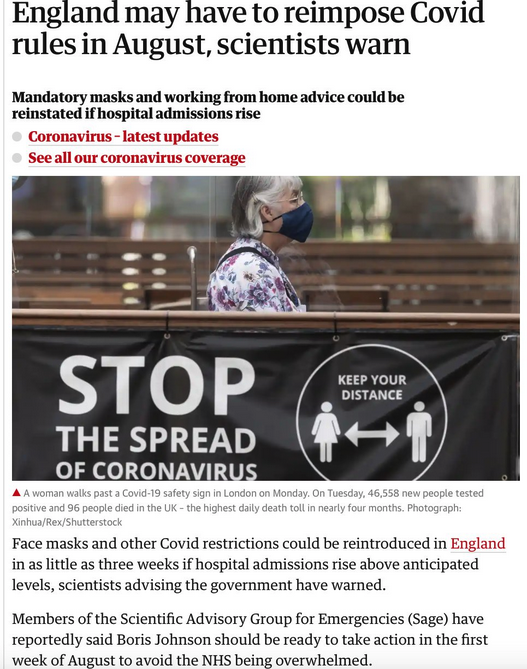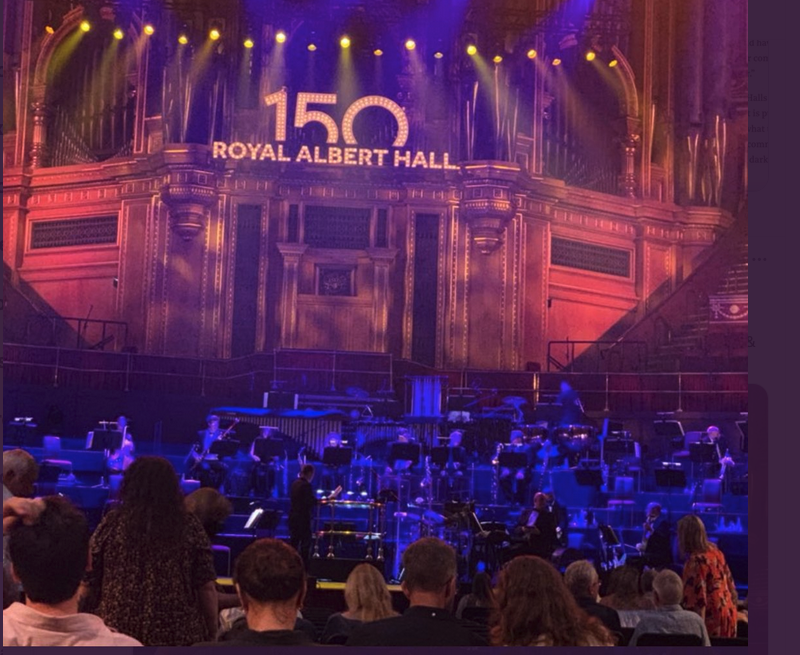We already know how the “pingdemic” is now doing for food supplies to supermarket shelves, according to today’s headlines, what Brexit was feared would cause; it is also, of course, playing havoc with theatre companies, whose shows have been forced to close for ten days at a time to deal with the self-isolation that’s required if someone in the show tests positive themselves or has prolonged exposure to someone who is Covid-positive.
That’s what did in for Andrew Lloyd Webber’s Cinderella last weekend, leading last Saturday’s shows to be cancelled — but why on earth they then delayed announcing that Monday’s press night and Tuesday’s gala were cancelled until Monday at 4pm is still a mystery to me. Surely, having got a positive case in their ranks on Saturday, that would have meant the show being cancelled for the next 10 days anyway. Or am I missing something here?
We’ve already seen shows like Hairspray and Prince of Egypt have to cancel, amongst others; when Prince of Egypt returned the night before last (July 21), Liam Tamne made a curtain speech, acknowledging the difficulties faced by the show’s producers Michael McCabe and Neil Laidlaw, “when the government do not support the arts.”
Actually, the government appears to be making an unholy mess of everything, not least the messaging around what what we can and can’t, should and shouldn’t do. As Labour MP Jess Phillips writes in today’s Independent,
“…the idea that Boris Johnson doesn’t know his arse from his elbow is not a concept I struggle with but, surely, there has got to be some master plan behind all the constant Covid-19 confusion. Tear off your marks – except please please wear a mask. Do go to France and enjoy your holidays – but, actually, please don’t go to France. Do whatever you want – but please try very hard to do that at a distance from one another.
On the day the freedom to go to nightclubs was producing viral videos of euphoric young people, the message came that in two months time this kind of wild abandon will very much not be allowed unless you can prove you have had been double jabbed. I was double jabbed on “freedom day” so I can brush off the glow sticks and get raving. / Clearer still is that this rule will be for nightclubs in particular with the government asserting that it wouldn’t be for pubs, because one man’s indoor, packed and poorly ventilated venue is another person’s completely safe public house…. There is one message that is being sent loud and clear, the government is flapping about aimlessly and people will die. I know there is no such thing as a perfect response in a crisis like this, but there is definitely such a thing as a very bad one. I give you the UK government in England.”
But if the government is failing us miserably, I’m afraid that the leadership of the British theatre industry is doing exactly the same. Theatres and other indoor entertainment venues were able to return to full capacity houses from last Monday; and some, but not all, have immediately adopted the new seating arrangement possibilities. (Whether or not, for example, Prince of Egypt will actually be able to fill all the seats in the Dominion now that it can actually sell them, as it is intending to do from tonight, is another question).
I’ve been back in London (and Windsor) this week, and attended four shows; there should have been a fifth, but that was the cancelled Cinderella. Three of the four shows I did see were sold as non-socially distanced; the fourth (Pippin at Charing Cross Theatre) was only sparsely attended, so social distancing was easy to achieve.
I was contacted in advance by the venues, each with a different plan for how they intended to maintain audience safety. For Cinderella at the Gillian Lynne on Monday, we were asked to bring proof of a recent negative test, or to take a test on arrival at the theatre; obviously the performance didn’t happen, so I don’t know how that would have worked out.
For the “Best of the West End” at the Royal Albert Hall on Wednesday, the organisers Alpha Solutions e-mailed two days ahead of the event to say:
Whilst today is “Freedom Day” the Government have advised the Royal Albert Hall to try and maintain some levels of health and safety for all visitors to the Hall. As a result, there is a possibility that you may be asked to show your Covid status (negative lateral flow test result within the last 72 hours, proof of double vaccination or proof of natural immunity) through the NHS Covid Pass on the NHS App, NHS.UK, or as a letter that can be requested by ringing NHS 119. Customers can also show text or email confirmation of test results from either a PCR or rapid lateral flow test. Free rapid lateral flow tests can be ordered from the Gov.uk website at https://test-for-coronavirus.service.gov.uk/order-lateral-flow-kits/condition
And for the return of Come from Away to the Phoenix Theatre last night, we were told:
“Please arrive 30-90 minutes prior to the event start time to aid with the safe movement of customers around our venue.
To ensure the continued safety of our visitors and staff, all attendees over the age of 18 will be required to provide proof of their COVID-19 status to gain entry to the venue. Attendees under the age of 18 must provide verbal confirmation that they have not tested positive nor are currently suffering from symptoms of COVID-19 by their parent, guardian, or from the individual themselves if they are aged 16 or 17 years.
Please note that failure to provide your details may result in you being refused entry without a refund. If you, or any members of your booking, are unable or unwilling to provide their COVID-19 status, please contact us as soon as possible.”
Everyone was making up their own rules as they went along, it seems. Yet it seems to me that, as a body who are responsible for most West End and regional theatre managements, SOLT and UK Theatre (with Julian Bird is CEO of both) should have got their members to agree to a standard, unambiguous protocol that all would enforce. Instead, they simply issued guidance — with Bird saying, as I wrote here on Wednesday,
“We hope audience members show respect for fellow theatregoers and staff by continuing to wear face coverings when coming into our venues and moving around them.”
That lays the onus on theatregoers themselves whether or not to mask up, just as the government now insists that such things are a matter of personal choice and responsibility.
And my personal experience of this is that audiences at Windsor for Hamlet and at the Phoenix for Come from Away largely abided by the mask recommendation — but probably 50% of those at the Albert Hall did not, including the young women sitting immediately to my right.
This is simply not good enough. Though I enjoyed the Albert Hall concert, I wish I’d not gone now. Too late to say after the event, I know; but it is going to make me wary of going to the venue again.
For the BBC Proms, running from next Friday (July 30) to September 11, the venue will once again be run at full capacity; and according to The Guardian news report,
“Attendees will be required to provide proof of their vaccination or Covid status in order to enter London’s Royal Albert Hall. Anyone over the age of 18 will need to provide evidence of a negative lateral flow test taken within 48 hours of the performance they are attending, proof of double vaccination, or natural immunity based on a previously positive PCR test taken within 180 days of the performance. Children will need verbal confirmation from a parent or guardian that they have not had a positive test.”
Meanwhile, other venues are taking an even more circumspect approach to their audience’s concerns around safety. On Monday, the Bristol Old Vic announced that they would “continue to offer the option of socially distanced shows after ‘freedom day'” and explained,
“For all long-running shows until March 2022, the theatre will guarantee two performances each week will remain socially distanced, in order to cater for vulnerable members of the public or those who need to keep extra precautions in place. These socially distanced performances will also require mandatory mask-wearing, whatever happens to other rules in the theatre or in society at large./ Since the summer of 2020, theatres have shown themselves among the COVID-safest spaces for public to visit. The government’s Events Research Programme in the spring and the latest announcements from UK Theatre show that indoor performances are safe to attend, but audiences remain cautious about a return to full capacity.”

And in their announcement of their next shows in their main house and downstairs studio for September and October, Hampstead Theatre yesterday revealed:
The Memory of Water will remain with reduced capacity and socially distancing from 3 September until 25 September. The theatre hopes to increase capacity from 27 September but out of concern for audiences, staff and performing companies, it is exercising caution and will not be putting these dates on sale until closer to the time. Malindadzimu will remain with reduced capacity and social distancing for the duration of its run.
This seems to be entirely the right approach. Throwing caution — and precautions — the wind is a recipe for disaster. Already, as The Guardian reported on Wednesday, the “freedoms” we’ve apparently gained may be short-lived:


